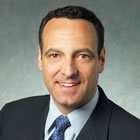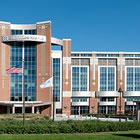Because the coronary artery is completely closed, the standard injection of contrast dye is blocked and therefore not able to reveal the pathway for the advancement of the various guide wires, catheters and balloons that are used. If the blockage cannot be crossed and reopened via angioplasty, it is either left alone or treated with open heart coronary artery bypass grafting (CABG).
The treatment of CTOs has the subject of many studies, sessions at international symposia, even meetings dedicated to the issue, such as the CTO Summit, being held in New York next month by the Cardiovascular Research Foundation.
See this short video clip from a 1985 interview with the inventor of coronary angioplasty, Andreas Gruentzig, addressing the question of total occlusions.
The grant being given to Saint Luke's Mid America Heart Institute by Boston Scientific will aid in helping to "better define the success, safety, health benefits, and cost-effectiveness of novel methods to open challenging blocked coronary arteries previously thought untreatable through minimally invasive techniques," and specifically examining a new Hybrid technique being pioneered at Mid America by Dr. Aaron Grantham and his team..
This morning's press release from Saint Luke's Mid America Heart Institute follows:
Saint Luke's awarded $3.4 million grant from Boston Scientific for further research into innovative cardiac procedures
Funding will support exploration of 'final frontier' in angioplasty
January 27, 2014 -- Kansas City, Missouri -- Saint Luke's Mid America Heart Institute has been awarded a $3.4 million, three-year grant from Boston Scientific to investigate and better define the success, safety, health benefits, and cost-effectiveness of novel methods to open challenging blocked coronary arteries previously thought untreatable through minimally invasive techniques.
One in six patients found to have plaque buildup in their arteries has at least one artery that is completely closed. Historically, these blockages, called chronic total occlusions or CTOs, have been treated with medications or bypass surgery. CTOs often result in chest pain, shortness of breath, and fatigue.
Many physicians are reluctant to open CTOs with the minimally invasive technique of angioplasty, because it's considered too risky, and because of the time and complexity involved in manipulating a guide wire through an artery, past the blockage to inflate a tiny balloon and open blood flow.
Saint Luke's has been on the forefront of perfecting emerging new approaches to treat difficult blockages previously regarded as untreatable. Aided by improved technologies and techniques, angioplasty experts at Saint Luke's have achieved success rates in restoring blood flow as high as 90 percent using innovative "hybrid" techniques few physicians are skilled enough to perform.
"CTOs are often called the 'final frontier in cardiology' because it takes a dedicated team and operators skilled in multiple techniques to successfully open a totally blocked artery using a minimally invasive angioplasty," said interventional cardiologist J. Aaron Grantham, M.D.
Angioplasty for CTO offers symptom relief and a minimally invasive alternative to potentially thousands of patients who may welcome an alternative to surgery, patients for whom bypass surgery is too risky, and others whose surgically repaired arteries have reclogged, added Dr. Grantham.
Hybrid therapy involves a variety of techniques using non-traditional routes to manipulate and open arteries. Success rates are heavily influenced by experience in the procedure. Saint Luke's is among a select group of hospitals in the nation to develop these advanced skills. Expert interventional cardiologists like Dr. Grantham, and Barry Rutherford, M.D., in Saint Luke's CTO program are highly regarded for their expertise and leadership in the field, and regularly provide teaching courses to benefit practitioners from around the world.
Despite improving success rates and better procedural efficiencies for CTO angioplasty with the hybrid technique, knowledge gaps remain that can only be filled by rigorous medical research.
The grant funding from Boston Scientific to Saint Luke's will advance medical research into these important clinical questions about CTO angioplasty. Saint Luke's has organized the Open CTO registry enrolling consenting patients at 10 hospitals across the country currently using the new hybrid CTO approaches. A total of 1,000 patients in the study will give Saint Luke's the statistical power to examine the safety, effectiveness, appropriateness, health outcomes, and cost-effectiveness of the hybrid approach to CTO angioplasty. Dr. Grantham will serve as the research study's principal investigator. Patient enrollment will begin in early 2014.
"Restoring blood flow to a totally occluded vessel may provide symptom relief and improve quality of life, ventricular function and survival," said Keith Dawkins, executive vice president and global chief medical officer, Boston Scientific. "Boston Scientific is committed to transforming lives through innovative medical solutions and is pleased to support Saint Luke's work on this important study which will provide physicians with a greater understanding of the benefits of treating chronic total occlusions."

David J. Cohen, MD |
"We are proud to be the coordinating center for this important multicenter study," said David J. Cohen, M.D., M.Sc., director of Cardiovascular Research at Saint Luke's Mid America Heart Institute and professor of medicine at the University of Missouri-Kansas City. "By providing world-class expertise in interventional cardiology procedures along with extensive research capabilities in data analysis, health status assessment, and health economics, we are ideally positioned to lead this major research effort that will help to define a new frontier in cardiovascular medicine."
More information about Saint Luke's treatment of coronary chronic total occlusions can be found at http://www.saintlukeshealthsystem.org/cto
About Saint Luke's Mid America Heart Institute
Saint Luke's Mid America Heart Institute, a member of Saint Luke's Health System and a teaching affiliate of the University of Missouri-Kansas City, is one of the preeminent cardiovascular programs in the country. Its legacy of innovation began more than 25 years ago when it opened as the nation's first heart hospital. Since then, the Heart Institute has earned a world-wide reputation for excellence in the treatment of heart disease, including interventional cardiology , cardiovascular surgery , imaging , heart failure , transplant , heart disease prevention , women's heart disease , electrophysiology , outcomes research, and health economics . With more than 50 full-time board certified cardiovascular specialists on staff, the Heart Institute offers one of the largest heart failure/heart transplant programs in the country, has the largest experience with transcatheter aortic valve replacement in the Midwest, and is a global teaching site for the newest approaches to opening challenging blocked arteries using minimally invasive techniques.


